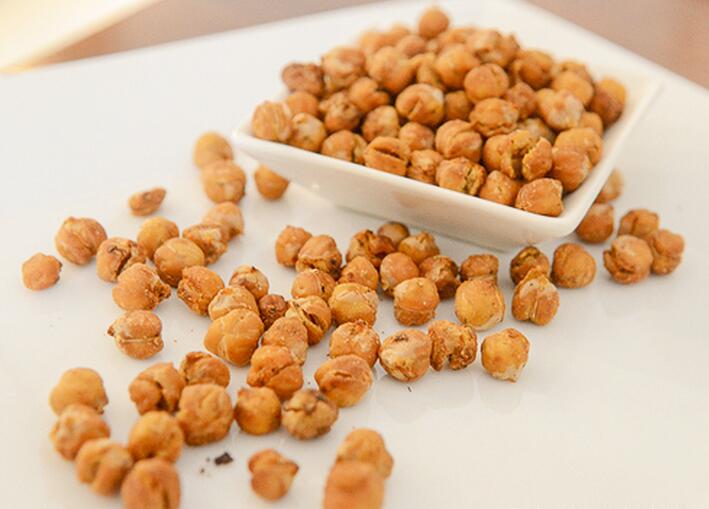Chickpeas are also referred to as garbanzo beans, ceci beans, or Bengal grams. They are beige-colored legumes that have been a dietary staple in places like the Middle East, India, and the Mediterranean for thousands of years. They have recently soared in popularity across the Western world. But can dogs eat chickpeas as well? Do chickpeas offer health benefits? We’ll cover everything you need to know about feeding chickpeas to your furry friend.
Can Dogs Eat Chickpeas?
Yes, dogs can eat chickpeas in moderation, but there are some important guidelines to follow:
- Chickpeas should be cooked and plain without any additional seasonings or ingredients. Raw or uncooked chickpeas are difficult for dogs to digest.
- Canned chickpeas should be rinsed to remove excess sodium. Avoid any with preservatives or flavorings added.
- Chickpeas should be chopped or mashed to reduce choking hazards, especially for small dogs.
- Only feed a few pieces at a time to avoid digestive issues. Don’t exceed 2-3 tablespoons for small dogs or 1/4 cup for large dogs daily.
- Monitor your dog’s reaction, stopping feeding if you notice excessive gas, loose stool, or other concerns.
- Chickpeas are not recommended for puppies under 1 year old.
Are chickpeas good for dogs? Nutritional Benefits of Chickpeas
Yes, chickpeas can be a healthy, beneficial addition to most dogs’ diets. When fed properly and in moderation, chickpeas are rich in several nutrients that are good for dogs, including:
- Source of Protein: Chickpeas offer a substantial amount of plant-based protein, providing about 15 grams per cooked cup. This makes them a great animal protein substitute.
- Fiber: A single serving provides over 12 grams of fiber, nearly half the daily fiber needed. This aids in healthy digestion.
- Folate: Also called vitamin B9, folate is essential for cell growth and renewal and chickpeas are packed with it. Just one cup contains over 80% of your recommended daily intake.
- Iron: Critical for oxygen circulation and cell function, chickpeas provide over 20% of your iron needs in a cup.
- Magnesium: This mineral plays a multitude of roles like bone development, immune function, muscle and nerve operation, blood glucose control, and more. A single cup contains about 30% of the RDI for magnesium.
- Manganese: This trace mineral is not as well known as others but is still crucial. It contributes to bone health, wound healing, metabolism, and brain and nerve function.
- Phosphorous: Works closely with calcium to support bone, teeth, and cell structure. Also assists kidney function.
- Zinc: Supports immune function, cell growth, wound healing, DNA and protein production, and growth & development.
- Potassium: Necessary for fluid balance, nerve transmission, and muscle contraction.
Health Benefits of Chickpeas for Dogs
There are many benefits for dogs including:
1. Weight Management
Chickpeas are very low in fat and calories. This makes them a good snack option for overweight dogs. The high fiber and protein also help dogs feel fuller.
2. Digestive Regularity
The high fiber content of chickpeas may help promote regular bowel movements and soften stool. This makes them beneficial for dogs struggling with constipation or diarrhea.
3. Diabetes Management
The complex carbs and high protein in chickpeas help stabilize blood sugar fluctuations, perfect for diabetic pups.
4. Increased Energy
Several key nutrients in chickpeas like iron, magnesium, and B Vitamins help dogs better convert food into usable energy.
5. Skin, Coat & Allergy Aid
The zinc in chickpeas promotes skin & coat health. They are also packed with antioxidants that can help dogs with seasonal allergies and itchiness.

Are Chickpeas Safe For Dogs? How to Feed Your Dog Chickpeas
The good news is that yes. Dogs can eat chickpeas with a few preparation guidelines and serving precautions.
Here is what you need to know about the safety of feeding chickpeas to dogs:
1. Preparation Guidelines
- Cooked chickpeas are safe, but never feed dogs raw, dried chickpeas as they are difficult to properly digest.
- Canned chickpeas are the easiest for dogs to consume. Drain and rinse them to remove excess sodium from the canning liquid.
- If using cooked dried chickpeas, make sure they are soaked and fully cooked through until very soft.
- Mash or chop chickpeas into small pieces so they are easier for your dog to chew and prevent choking.
2. How Many Chickpeas Can a Dog Eat?
- Always start slowly with new foods. Begin by mixing a few chickpea pieces into their regular meals.
- For small dogs, a few chickpea slices make good individual treats.
- Don’t exceed 2-3 tablespoons of mashed chickpeas for small dogs or 1/4 cup for larger breeds in a day. Too much can lead to digestive upset.
- If your dog experiences any gas, bloating, or diarrhea after eating chickpeas, stop serving them.
3. Choking Hazards
The other safety consideration with chickpeas is the potential choking risk. To mitigate this:
- Chop or mash canned chickpeas into small pieces.
- Avoid feeding dogs whole garbanzo beans.
- Closely supervise your dog anytime you feed chickpeas to watch for proper chewing and swallowing.
Follow these preparation, serving size, and supervision guidelines when introducing chickpeas to ensure your dog’s safety. But even if chickpeas are safe, do they offer any real health benefits? Let’s explore further.
How to incorporate Chickpeas into your dog’s diet?
Now that we’ve covered the key safety considerations, proper preparations, and amounts to feed, let’s look at some of the best ways to incorporate garbanzo beans into your dog’s diet.
1. Mixing Chickpeas Into Food
One easy method is mixing small amounts of drained, rinsed, mashed chickpeas into your dog’s regular kibble or homemade recipes. The chickpea pieces will add extra protein, fiber, and flavor. This helps dogs with sensitivity try chickpeas safely in small doses.
2. Chickpea Broth & Liquid
For dogs hesitant to try whole chickpeas, try mixing a few spoonfuls of the liquid from canned chickpeas into their food instead. This chickpea broth retains much of the same nutritional value. Increased gradually, it allows picky pups to get accustomed to the flavor.
3. As Occasional Treats
Well-chewed, mashed chickpea pieces also make a healthy, crunchy treat for dogs. In moderation, feel free to reward your pup with a few garbanzo bean slices. It beats processed treats and satisfies cravings for human food!
Potential Risks and Side Effects
However, while chickpeas provide important vitamins and minerals for dogs, there are also some potential adverse side effects to consider as well:
1. Gas and Bloating
As with many legumes, too many chickpeas at once can lead to gas, abdominal discomfort, or potentially dangerous bloating. Always start slowly with new foods.
2. Allergic Reactions
Some dogs may have allergic reactions to chickpeas. Discontinue feeding chickpeas and see your vet if any concerning symptoms develop like diarrhea, vomiting, or skin irritation.
3. Weight Gain
Despite being low-calorie, too many chickpeas can lead to excess calories and obesity over time which strains joints and impacts health. Stick to recommended serving sizes.
4. Long-Term Effects
Research is limited on the very long-term impacts of feeding dogs chickpeas frequently or in large amounts. Variety and moderation are best when incorporating new foods.
Comparison to Other Legumes
How do chickpeas compare safety and nutrition-wise to other legumes like peas, beans, and lentils? Here is a quick comparison:
| Legume | Nutritional Benefits | Dog Safety |
|---|---|---|
| Chickpeas | High in protein, fiber, iron, magnesium | Safe in moderation |
| Black Beans | Fiber, protein, antioxidants | Only cooked & mashed |
| Lentils | Protein, iron, potassium | Generally safe |
| Green Peas | Vitamins A, K, B, fiber | Safe frozen or thawed |
In the legume family, properly prepared chickpeas stand out as a great option to mix into dog food or give as occasional treats. They offer a powerhouse of nutrition.
Can Dogs Eat Other Chickpea-Based Foods and Products?
1. Chickpea Flour
Yes, chickpea flour is generally safe for dogs to eat. It can be used to bake homemade dog treats. Chickpea flour provides protein, fiber, vitamins, and minerals just like whole chickpeas.
However, be sure baked goods and treats containing chickpea flour are fully cooked. Avoid any other ingredients like garlic, onions, artificial flavors, salt, or xylitol, which are toxic for dogs.
2. Raw Chickpeas
Raw chickpeas should be avoided, as they may present a choking hazard. Whole, uncooked chickpeas expand when soaked in liquid. Only feed dogs chickpeas that have been soaked, boiled, or canned until thoroughly cooked and soft.
3. Roasted Chickpeas
Dry roasted or air-fried chickpeas are safe for dogs as long as they don’t contain any added oils, spices, or seasonings. Plain roasted chickpeas make a crunchy, fiber-rich snack. But limit intake to avoid overfeeding.
4. Chickpea Noodles or Pasta
Chickpea pasta can be an alternative to wheat-based pasta for dogs. However, you need to ensure it’s cooked before feeding. Check labels for any ingredients of concern. Whole chickpeas would provide more nutrients.
5. Chickpea Chips
Avoid feeding dogs flavored chickpea chips or crunchy snack foods, which often contain onion, garlic, or salt. Plain roasted chickpeas would be safer and healthier.
Other Questions
1. Can chickpeas cause gas in dogs?
Yes, chickpeas can cause gas, bloating, or flatulence in some dogs. Their high fiber and complex sugar content can be difficult for some dogs to digest. Introduce chickpeas slowly and discontinue use if you notice excessive gas or gastrointestinal issues.
2. Can Dogs Eat Hummus?
No, dogs should not eat traditional hummus. While chickpeas themselves are safe for dogs, hummus often contains garlic, lemon juice, tahini, and spices that can cause stomach upset.
Large amounts of sodium and garlic can also be hazardous to dogs. It’s safer to feed dogs plain, low-sodium canned chickpeas.
3. Can my dog eat canned chickpeas?
Yes, dogs can safely eat canned chickpeas in moderation. Canned chickpeas are already cooked, making them easy for dogs to digest. Just be sure to drain and rinse the chickpeas first to remove any excess sodium from the canning liquid.
It’s best to mash or chop canned chickpeas into small pieces before feeding to reduce choking risk. Well-chewed chunks make a nutritious crunchy treat. You can also mash chickpeas into a paste to mix into your dog’s regular kibble.
When first introducing canned chickpeas, start slowly with a few spoonfuls at a time. Monitor your dog’s digestion closely for any diarrhea, gas, or bloating. Limit intake to a few tablespoons per day for small dogs and 1/4 cup for larger breeds.
4. What’s the best way to prepare chickpeas for my dog?
Drain and rinse canned chickpeas to remove excess sodium, then chop or mash them into bite-sized pieces. Cooked dried chickpeas that have been soaked overnight and boiled until very soft can also be mashed for dogs once cooled. Avoid feeding dogs raw, dried, or uncooked chickpeas.
5. Can Puppies Eat Chickpeas?
Many dog owners also wonder if chickpeas are safe for puppies to consume. The answer is generally no – chickpeas are not recommended for puppies under 1 year old. Here’s why:
A puppy’s digestive system is still developing and may struggle to properly break down and digest whole legumes like chickpeas. This can lead to diarrhea, gas, or vomiting which is especially dangerous for puppies prone to dehydration. Their gut flora and enzyme secretions are also still maturing through age 12 months.
The other key concern is of course choking. Puppies are notorious for not properly chewing their food which makes whole chickpeas or pieces a major choking hazard. For both these reasons, it’s best to wait until after 1 year old before considering introducing chickpeas.
Conclusion: Are Chickpeas Good or Bad For Dogs?
So, what’s the final consensus – are chickpeas good or bad for dogs? Yes! Chickpeas can be a healthy, safe addition to most dogs’ diets, with some caveats. Their dense nutritional profile filled with protein, vitamins, minerals, and fiber provides important health benefits. When fed properly and in moderation, chickpeas make a great occasional treat or addition to homemade dog food.





